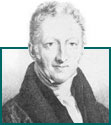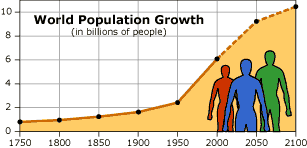
Thomas Malthus (1766-1834) has a hallowed place in the history of biology, despite the fact that he and his contemporaries thought of him not as a biologist but as a political economist. Malthus grew up during a time of revolutions and new philosophies about human nature. He chose a conservative path, taking holy orders in 1797, and began to write essays attacking the notion that humans and society could be improved without limits.
Population growth vs. the food supply
Malthus’ most famous work, which he published in 1798, was An Essay on the Principle of Population as it affects the Future Improvement of Society. In it, Malthus raised doubts about whether a nation could ever reach a point where laws would no longer be required, and in which everyone lived prosperously and harmoniously. There was, he argued, a built-in agony to human existence, in that the growth of a population will always outrun its ability to feed itself. If every couple raised four children, the population could easily double in twenty-five years, and from then on, it would keep doubling. It would rise not arithmetically—by factors of three, four, five, and so on—but geometrically—by factors of four, eight, and sixteen.

If a country’s population did explode this way, Malthus warned that there was no hope that the world’s food supply could keep up. Clearing new land for farming or improving the yields of crops might produce a bigger harvest, but it could only increase arithmetically, not geometrically. Unchecked population growth inevitably brought famine and misery. The only reason that humanity wasn’t already in perpetual famine was because its growth was continually checked by forces such as plagues, infanticide, and simply putting off marriage until middle age. Malthus argued that population growth doomed any efforts to improve the lot of the poor. Extra money would allow the poor to have more children, only hastening the nation’s appointment with famine.
A new view of humans
Malthus made his groundbreaking economic arguments by treating human beings in a groundbreaking way. Rather than focusing on the individual, he looked at humans as groups of individuals, all of whom were subject to the same basic laws of behavior. He used the same principles that an ecologist would use studying a population of animals or plants. And indeed, Malthus pointed out that the same forces of fertility and starvation that shaped the human race were also at work on animals and plants. If flies went unchecked in their maggot-making, the world would soon be knee-deep in them. Most flies (and most members of any species you choose) must die without having any offspring. And thus when Darwin adapted Malthus’ ideas to his theory of evolution, it was clear to him that humans must evolve like any other animal.
